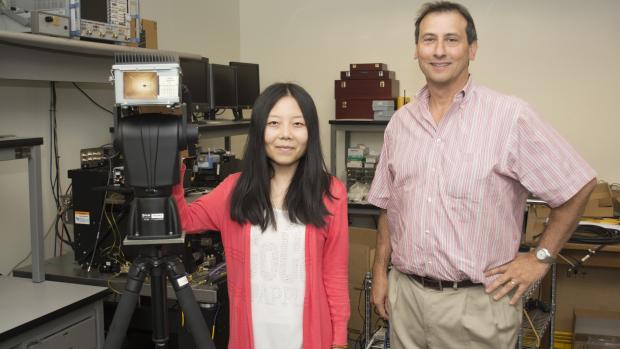NYU Wireless Doctoral Candidate Garners Marconi Society Young Scholars Award
Shu Sun Lauded for Role in Showing Stakeholders that 5G Millimeter Wave Communications Is Viable

Doctoral student Shu Sun, pictured here with NYU WIRELESS founding director Ted Rappaport, received the 2017 Paul Baran Young Scholar Award from the Marconi Society.
BROOKLYN, New York – The Marconi Society has honored Shu Sun — an electrical engineering doctoral student at the NYU Tandon School of Engineering and a researcher at NYU WIRELESS — with the 2017 Paul Baran Young Scholar Award for her work on proving that the millimeter wave (mmWave) spectrum holds the promise of providing reliable broadband access to people around the world.
The Society cited her contributions as the lead student author of the seminal 2013 paper “Millimeter Wave Mobile Communications for 5G Cellular: It Will Work,” based on an analysis of NYU’s massive data sets. Her other noted accomplishments include leading the 3GPP global standards body to adopt her close-in free space path loss model as an optional model and developing the world’s first open source channel modeling software, NYUSIM, which accurately recreates difficult-to-take field measurements on a computer and is relied upon by over 8,000 engineers worldwide to understand radio propagation for 5G mmWave frequencies.
“Shu Sun has demonstrated her ability to change minds and lead the world to completely new approaches that were once thought impossible or untenable,” said Theodore Rappaport, NYU WIRELESS Founding Director and David Lee / Ernst Weber Professor at NYU Tandon. “Were it not for her intellect and tenacity to attend conferences, work with industry leaders, and continually urge consideration for what she knew and that others had not yet come to accept, we probably would not now be talking about 5G millimeter wave wireless communications.”
An accomplished researcher with over 35 major publications and more than 4,000 Google scholar citations to her credit, Sun is the co-author of three prize-winning papers that have helped the world understand the propagation characteristics of mmWave channels and the potential of directional beam antennas to improve the capacity of mmWave communications. Her work addresses how mmWave signals propagate in various urban, rural, and indoor scenarios and how to ensure that these signals are reliably and consistently available for high bandwidth applications in any environment. “This is important because it underpins the near future of wireless and greatly impacts how we communicate with each other and with things around us, such as vehicles and electronics,” Sun explains. “The work that my teammates and I are doing will help alleviate the spectrum crunch problem in current microwave bands and will allow for much higher data rates and channel capacity for 5G wireless.”
Sun’s research — and the confidence it has instilled that 5G will be the wave of the wireless future — has helped to drive significant investment in the industry by communications providers, equipment manufactures and device makers.
Sun, whose other honors include a 2015 IEEE Donald G. Fink Award and a 2016 IEEE Vehicular Technology Society Best Paper Award, is the second consecutive Tandon graduate student to receive the Paul Baran Young Scholar Award. Last year, George MacCartney, Jr., garnered the prestigious prize.
About the New York University Tandon School of Engineering
The NYU Tandon School of Engineering dates to 1854, the founding date for both the New York University School of Civil Engineering and Architecture and the Brooklyn Collegiate and Polytechnic Institute (widely known as Brooklyn Poly). A January 2014 merger created a comprehensive school of education and research in engineering and applied sciences, rooted in a tradition of invention and entrepreneurship and dedicated to furthering technology in service to society. In addition to its main location in Brooklyn, NYU Tandon collaborates with other schools within NYU, the country’s largest private research university, and is closely connected to engineering programs at NYU Abu Dhabi and NYU Shanghai. It operates Future Labs focused on start-up businesses in downtown Manhattan and Brooklyn and an award-winning online graduate program. For more information, visit engineering.nyu.edu.




